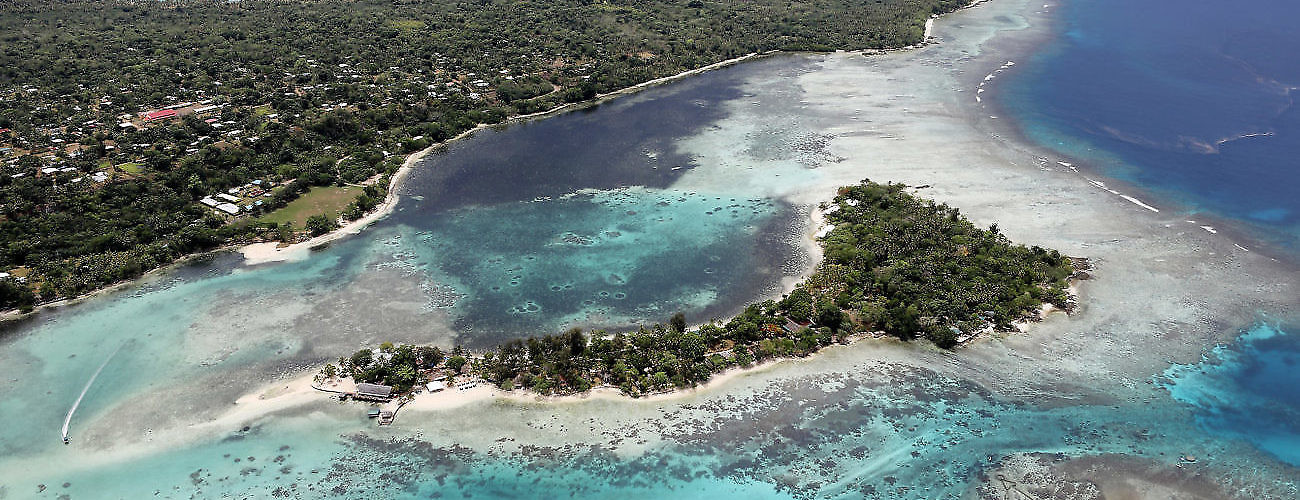An aerial view of Erakor island and the coastline of Port Vila in Vanuatu in the Pacific Ocean, where the sea level has risen about 6mm per year since 1993, a rate nearly twice the global average. (Photo by Mario Tama/Getty Images)
The level of action, or inaction, on climate change in recent years conveys the reality that climate risks and climate security have fallen off the global agenda. This is particularly true since the beginning of the COVID-19 pandemic. Climate change has taken a back seat in the political economy discourse and much of the momentum towards reversing climate change’s effects has slowed, or reversed. This shift is also felt at the United Nations—including the Security Council—where member state consensus on core global issues, among them climate change, has been eroding.
The declaration adopted by the UN General Assembly in September to mark the 75th anniversary of the United Nations fell short of any positive reassurance that countries are taking their commitment to the Paris Agreement seriously. This year was to be a moment that captured rising ambition to meet the goals of the agreement by countries submitting enhanced Nationally Determined Contributions (NDCs). Instead, with the global economy in recession, a pertinent question is: what can realistically be expected of countries in their commitments?
While there are countries that are committing to a green recovery, such as South Korea, some of the largest emitters are doubling down on support to coal and fossil fuel companies. Moreover, medium-sized economies, such as many in Latin America, are being hit so strongly by the pandemic that there are fears that the coming years will be a “lost decade.” The temptation for countries that have suffered immense human and economic loss will be to regain economic stability above anything else, even protecting present and future generations from the devastation that inaction on climate change will bring.
Climate scientists are able to fairly confidently predict that if the commitments under the Paris Agreement are not upheld then, at the very least, massive migrations, acute water scarcity, and loss of human life will result due to climate change. This is before considering unknown factors like the COVID-19 pandemic, which has made clear that humanity is more vulnerable than expected and that world conditions can easily shift towards unpredictable scenarios. A potential silver lining in this regard is that COVID-19 may not only shift the way humanity produces and consumes, it might also make people more open to believing the predictions of climate scientists.
Compounding responses to both climate change and the COVID-19 pandemic is the general lack of leadership and multilateral cohesion, at a time when it is most needed. In previous global shocks, the vast majority of nations—particularly wealthy ones—united. During the 2008 economic crisis, for example, the G20 formed. During the COVID-19 pandemic, however, there has been little movement to work together. UN Secretary-General Antonio Guterres highlighted this in his comments before the Security Council in September, a body at the epicenter of this multilateral disarray. The ongoing dynamics between the permanent five (P5) members have rendered the Security Council dysfunctional in many areas pertinent to the maintenance of peace and security.
While the debate of including climate change on the official agenda of the Security Council has been fraught with tension, the fact remains that if climate change continues unabated, the smallest and most fragile countries will need significant multilateral support, at a time when it seems the least likely. Counting on the P5—which includes the world’s largest emitters in the United States and China—to lead in this critical time is not guaranteed. While some countries, such as the Pacific Island states, argue that the Security Council offers the visibility that climate change needs, the body’s inability to respond swiftly to the COVID-19 pandemic or to address serious breaches of international peace and security in Syria and Yemen raises serious doubts as to whether it will respond adequately to the issue of climate change.
It is thus a dilemma, particularly for a majority of smaller countries in the Global South, whether to trust the Security Council to address the security implications of climate change. While open debates are held and aria formulas convened, action on climate change continues to be more or less paralyzed at the political level. Until steps are taken to address the issues in the Security Council, the tension on climate change will continue. Unfortunately, the impacts of climate change also continue and will accelerate, and the world might not have the time to wait for these changes to take place.
Another silver lining is that outside Security Council walls, leadership at all levels is emerging. From ordinary citizens to leaders in government and business, people are increasingly stepping in to fill the vacuum. This year’s General Assembly, held 75 years after the founding of the United Nations, convened an array of stakeholders that will hopefully spur action on climate change and bring it back to the top of the global agenda.
This article is part of a series on climate change.





